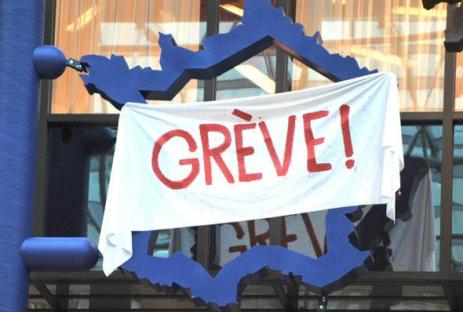You are here
Home ›The Struggles against Pensions “Reform” in France
The French ruling class, like the ruling class everywhere has been forced to step up its attacks on the working class in order to reduce their budget deficits. In France the attacks in 2010 took the form of a reduction in pensions rights.
At first union formal protests in the spring (there were three days of “action”) seemed to be the extent of the resistance.
However as the consequences of the reforms for everyone sank in the workers increasing anger forced the unions to unite in an Inter-syndical and to call for 7 more days of action in September and October. Unlike in the past, these mobilisations (which attracted 3 million people) have done nothing to assuage the anger of the working class. Indeed more and more workers (although still a small minority) have gone on to organise their own general assemblies open to all workers. At first these started in the streets at the end of the union demonstrations as in the case of Toulouse where the first assembly was formed in Avenue Jean Jaures (or as in the case of the example given below, with an introduction by one of the participants, on the platforms of the Gare de l’Est station in Northern Paris). All the assemblies in all the towns have as their common thread the idea that only by relying on their own autonomous strength rather than on the tired bureaucratic procedures of the unions. One of the strengths of it is the attempt to link the demand to reject the pensions “reform” with all the other miseries which the capitalist system has inflicted on the working class over the last two or three decades. Poverty, increasing job insecurity, and increasing exploitation have all stimulated the anger of the working class.
The Sarkozy regime must have thought it was dealing with one issue and one group when it began the attacks on pension rights but even school students and university students have made common cause with what they can see is the loss of a future. In some ways the insurrection of the students has caused more panic since they are not constrained by union manoeuvres. Today students are not just the privileged elite of society’s future managers as in the past, but make up a substantial sector of society being the sons and daughters of the working class [eloquently expressed in the leaflet by FIAT workers which we reproduce in the section on students in this issue].
For the moment though the General Assemblies have not yet given birth to a wider autonomous movement (and the Christmas holidays have given the Government a breathing space) but the sense of solidarity both within and without the country will not vanish quietly. If the movement is to go forward in 2011 it will be through the creation of more strike committees controlled by the strikers though general assemblies. The Assemblies themselves should remain open to all workers whatever their job or situation and these should draw in the population of whole areas. Real revolutionaries will also have to fight to ensure that the Assemblies remain open and not get dominated by the usual suspects of the Trotskyist or Stalinist varieties who will try to settle things in the old union way with secret committees behind closed doors.
These are prodigious demands but they could provide the basis for a struggle out of which a new wider working class consciousness can emerge into a new party, and ultimately a new programme for getting rid of capitalism, and replacing it with the collective producer class controlling just how the resources of society are to be used.
Revolutionary Perspectives
Journal of the Communist Workers’ Organisation -- Why not subscribe to get the articles whilst they are still current and help the struggle for a society free from exploitation, war and misery? Joint subscriptions to Revolutionary Perspectives (3 issues) and Aurora (our agitational bulletin - 4 issues) are £15 in the UK, €24 in Europe and $30 in the rest of the World.
Revolutionary Perspectives #56
Start here...
- Navigating the Basics
- Platform
- For Communism
- Introduction to Our History
- CWO Social Media
- IWG Social Media
- Klasbatalo Social Media
- Italian Communist Left
- Russian Communist Left
The Internationalist Communist Tendency consists of (unsurprisingly!) not-for-profit organisations. We have no so-called “professional revolutionaries”, nor paid officials. Our sole funding comes from the subscriptions and donations of members and supporters. Anyone wishing to donate can now do so safely using the Paypal buttons below.
ICT publications are not copyrighted and we only ask that those who reproduce them acknowledge the original source (author and website leftcom.org). Purchasing any of the publications listed (see catalogue) can be done in two ways:
- By emailing us at uk@leftcom.org, us@leftcom.org or ca@leftcom.org and asking for our banking details
- By donating the cost of the publications required via Paypal using the “Donate” buttons
The CWO also offers subscriptions to Revolutionary Perspectives (3 issues) and Aurora (at least 4 issues):
- UK £15 (€18)
- Europe £20 (€24)
- World £25 (€30, $30)
Take out a supporter’s sub by adding £10 (€12) to each sum. This will give you priority mailings of Aurora and other free pamphlets as they are produced.
ICT sections
Basics
- Bourgeois revolution
- Competition and monopoly
- Core and peripheral countries
- Crisis
- Decadence
- Democracy and dictatorship
- Exploitation and accumulation
- Factory and territory groups
- Financialization
- Globalization
- Historical materialism
- Imperialism
- Our Intervention
- Party and class
- Proletarian revolution
- Seigniorage
- Social classes
- Socialism and communism
- State
- State capitalism
- War economics
Facts
- Activities
- Arms
- Automotive industry
- Books, art and culture
- Commerce
- Communications
- Conflicts
- Contracts and wages
- Corporate trends
- Criminal activities
- Disasters
- Discriminations
- Discussions
- Drugs and dependencies
- Economic policies
- Education and youth
- Elections and polls
- Energy, oil and fuels
- Environment and resources
- Financial market
- Food
- Health and social assistance
- Housing
- Information and media
- International relations
- Law
- Migrations
- Pensions and benefits
- Philosophy and religion
- Repression and control
- Science and technics
- Social unrest
- Terrorist outrages
- Transports
- Unemployment and precarity
- Workers' conditions and struggles
History
- 01. Prehistory
- 02. Ancient History
- 03. Middle Ages
- 04. Modern History
- 1800: Industrial Revolution
- 1900s
- 1910s
- 1911-12: Turko-Italian War for Libya
- 1912: Intransigent Revolutionary Fraction of the PSI
- 1912: Republic of China
- 1913: Fordism (assembly line)
- 1914-18: World War I
- 1917: Russian Revolution
- 1918: Abstentionist Communist Fraction of the PSI
- 1918: German Revolution
- 1919-20: Biennio Rosso in Italy
- 1919-43: Third International
- 1919: Hungarian Revolution
- 1930s
- 1931: Japan occupies Manchuria
- 1933-43: New Deal
- 1933-45: Nazism
- 1934: Long March of Chinese communists
- 1934: Miners' uprising in Asturias
- 1934: Workers' uprising in "Red Vienna"
- 1935-36: Italian Army Invades Ethiopia
- 1936-38: Great Purge
- 1936-39: Spanish Civil War
- 1937: International Bureau of Fractions of the Communist Left
- 1938: Fourth International
- 1940s
- 1960s
- 1980s
- 1979-89: Soviet war in Afghanistan
- 1980-88: Iran-Iraq War
- 1980: Strikes in Poland
- 1982: First Lebanon War
- 1982: Sabra and Chatila
- 1986: Chernobyl disaster
- 1987-93: First Intifada
- 1989: Fall of the Berlin Wall
- 1979-90: Thatcher Government
- 1982: Falklands War
- 1983: Foundation of IBRP
- 1984-85: UK Miners' Strike
- 1987: Perestroika
- 1989: Tiananmen Square Protests
- 1990s
- 1991: Breakup of Yugoslavia
- 1991: Dissolution of Soviet Union
- 1991: First Gulf War
- 1992-95: UN intervention in Somalia
- 1994-96: First Chechen War
- 1994: Genocide in Rwanda
- 1999-2000: Second Chechen War
- 1999: Introduction of euro
- 1999: Kosovo War
- 1999: WTO conference in Seattle
- 1995: NATO Bombing in Bosnia
- 2000s
- 2000: Second intifada
- 2001: September 11 attacks
- 2001: Piqueteros Movement in Argentina
- 2001: War in Afghanistan
- 2001: G8 Summit in Genoa
- 2003: Second Gulf War
- 2004: Asian Tsunami
- 2004: Madrid train bombings
- 2005: Banlieue riots in France
- 2005: Hurricane Katrina
- 2005: London bombings
- 2006: Anti-CPE movement in France
- 2006: Comuna de Oaxaca
- 2006: Second Lebanon War
- 2007: Subprime Crisis
- 2008: Onda movement in Italy
- 2008: War in Georgia
- 2008: Riots in Greece
- 2008: Pomigliano Struggle
- 2008: Global Crisis
- 2008: Automotive Crisis
- 2009: Post-election crisis in Iran
- 2009: Israel-Gaza conflict
- 2020s
- 1920s
- 1921-28: New Economic Policy
- 1921: Communist Party of Italy
- 1921: Kronstadt Rebellion
- 1922-45: Fascism
- 1922-52: Stalin is General Secretary of PCUS
- 1925-27: Canton and Shanghai revolt
- 1925: Comitato d'Intesa
- 1926: General strike in Britain
- 1926: Lyons Congress of PCd’I
- 1927: Vienna revolt
- 1928: First five-year plan
- 1928: Left Fraction of the PCd'I
- 1929: Great Depression
- 1950s
- 1970s
- 1969-80: Anni di piombo in Italy
- 1971: End of the Bretton Woods System
- 1971: Microprocessor
- 1973: Pinochet's military junta in Chile
- 1975: Toyotism (just-in-time)
- 1977-81: International Conferences Convoked by PCInt
- 1977: '77 movement
- 1978: Economic Reforms in China
- 1978: Islamic Revolution in Iran
- 1978: South Lebanon conflict
- 2010s
- 2010: Greek debt crisis
- 2011: War in Libya
- 2011: Indignados and Occupy movements
- 2011: Sovereign debt crisis
- 2011: Tsunami and Nuclear Disaster in Japan
- 2011: Uprising in Maghreb
- 2014: Euromaidan
- 2016: Brexit Referendum
- 2017: Catalan Referendum
- 2019: Maquiladoras Struggle
- 2010: Student Protests in UK and Italy
- 2011: War in Syria
- 2013: Black Lives Matter Movement
- 2014: Military Intervention Against ISIS
- 2015: Refugee Crisis
- 2018: Haft Tappeh Struggle
- 2018: Climate Movement
People
- Amadeo Bordiga
- Anton Pannekoek
- Antonio Gramsci
- Arrigo Cervetto
- Bruno Fortichiari
- Bruno Maffi
- Celso Beltrami
- Davide Casartelli
- Errico Malatesta
- Fabio Damen
- Fausto Atti
- Franco Migliaccio
- Franz Mehring
- Friedrich Engels
- Giorgio Paolucci
- Guido Torricelli
- Heinz Langerhans
- Helmut Wagner
- Henryk Grossmann
- Karl Korsch
- Karl Liebknecht
- Karl Marx
- Leon Trotsky
- Lorenzo Procopio
- Mario Acquaviva
- Mauro jr. Stefanini
- Michail Bakunin
- Onorato Damen
- Ottorino Perrone (Vercesi)
- Paul Mattick
- Rosa Luxemburg
- Vladimir Lenin
Politics
- Anarchism
- Anti-Americanism
- Anti-Globalization Movement
- Antifascism and United Front
- Antiracism
- Armed Struggle
- Autonomism and Workerism
- Base Unionism
- Bordigism
- Communist Left Inspired
- Cooperativism and autogestion
- DeLeonism
- Environmentalism
- Fascism
- Feminism
- German-Dutch Communist Left
- Gramscism
- ICC and French Communist Left
- Islamism
- Italian Communist Left
- Leninism
- Liberism
- Luxemburgism
- Maoism
- Marxism
- National Liberation Movements
- Nationalism
- No War But The Class War
- PCInt-ICT
- Pacifism
- Parliamentary Center-Right
- Parliamentary Left and Reformism
- Peasant movement
- Revolutionary Unionism
- Russian Communist Left
- Situationism
- Stalinism
- Statism and Keynesism
- Student Movement
- Titoism
- Trotskyism
- Unionism
Regions
User login

This work is licensed under a Creative Commons Attribution 3.0 Unported License.


